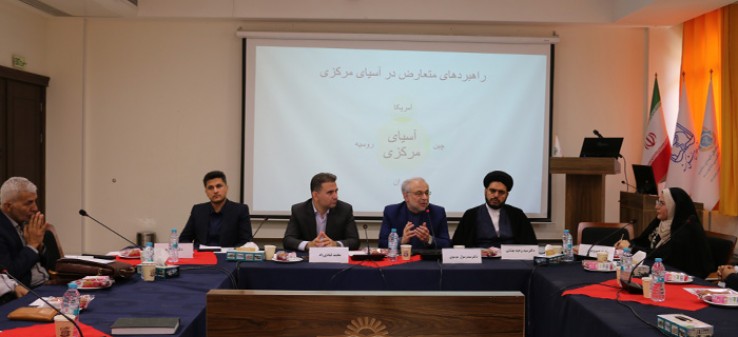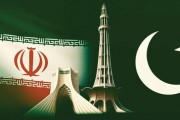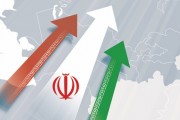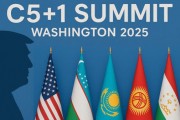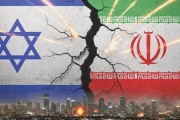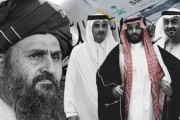Publish Date
Tuesday 16 September 2025 - 11:10
recommended
0
Seminar
Geoeconomic Capacities of Central Asia for the Islamic Republic of Iran
A specialized seminar titled “Geoeconomic Capacities of Central Asia for the Islamic Republic of Iran; Economic Opportunities and Threats in the Context of Global Power Rivalry” was held by the Institute for East Strategic Studies (IESS) with the participation of a group of experts, diplomats, professors, and regional affairs specialists.
A specialized seminar, entitled “Geoeconomic Capacities of Central Asia for the Islamic Republic of Iran; Economic Opportunities and Threats in the Context of Global Power Rivalry”, was hosted by IESS and attended by about 60 experts, diplomats, professors, specialists on regional issues, and representatives of various institutions.
The seminar, held from 8:00 AM to 12:00 PM on Tuesday, September 9, 2025, in Mashhad, Iran, and consisted of two 90-minute panels.
In the first panel, Dr. Seyed Rasoul Mousavi, former Director-General for South Asia at the Ministry of Foreign Affairs and former Ambassador of the Islamic Republic of Iran to Tajikistan, delivered a speech on Iran and conflicting strategies in Central Asia. Following him, Mr. Mohammad Ghobadi Rad, senior expert on Central Asian affairs, presented his lecture on requirements for seizing economic opportunities and countering threats arising from great power rivalry in Central Asia.
In the second panel, Dr. Seyed Vahid Beheshti, Director of The On the Silk Road Institute and expert on Chinese affairs, presented his views on potential grounds for China’s transition from geoeconomics to geopolitics in Central Asia, possible tensions with Russia and the U.S., and the implications of this geopolitical rivalry for the position and interests of the Islamic Republic of Iran. Afterward, Mr. Omid Rahimi, researcher at IESS, presented his analysis on Iran’s strategic capacities in Central Asia in the future relations with China, with a focus on transit corridors, and their outcomes in the Tehran-Beijing strategic partnership, with a critical review of current relations.
Also present at the seminar were Mr. Mohammad Sedighi Far, former Consul General of Iran in Herat; Mr. Alireza Sedaghat, expert at the North and East Mission of the Ministry of Foreign Affairs of Iran, in Mashhad; Dr. Ali Soroush, Head of the world studies department at Imam Hossein University, and President of the Sadr Research Institute; Dr. Barat Shamsa, Central Asia expert and university professor; Dr. Alireza Charmagi, Director of the Regional Office of Fars News Agency; Mr. Ahmad Ghasemzadeh, Central Asia expert and researcher at IESS; along with a group of experts, professors, and students, who all participated in discussions and professional exchanges.


The seminar, held from 8:00 AM to 12:00 PM on Tuesday, September 9, 2025, in Mashhad, Iran, and consisted of two 90-minute panels.
In the first panel, Dr. Seyed Rasoul Mousavi, former Director-General for South Asia at the Ministry of Foreign Affairs and former Ambassador of the Islamic Republic of Iran to Tajikistan, delivered a speech on Iran and conflicting strategies in Central Asia. Following him, Mr. Mohammad Ghobadi Rad, senior expert on Central Asian affairs, presented his lecture on requirements for seizing economic opportunities and countering threats arising from great power rivalry in Central Asia.
In the second panel, Dr. Seyed Vahid Beheshti, Director of The On the Silk Road Institute and expert on Chinese affairs, presented his views on potential grounds for China’s transition from geoeconomics to geopolitics in Central Asia, possible tensions with Russia and the U.S., and the implications of this geopolitical rivalry for the position and interests of the Islamic Republic of Iran. Afterward, Mr. Omid Rahimi, researcher at IESS, presented his analysis on Iran’s strategic capacities in Central Asia in the future relations with China, with a focus on transit corridors, and their outcomes in the Tehran-Beijing strategic partnership, with a critical review of current relations.
Also present at the seminar were Mr. Mohammad Sedighi Far, former Consul General of Iran in Herat; Mr. Alireza Sedaghat, expert at the North and East Mission of the Ministry of Foreign Affairs of Iran, in Mashhad; Dr. Ali Soroush, Head of the world studies department at Imam Hossein University, and President of the Sadr Research Institute; Dr. Barat Shamsa, Central Asia expert and university professor; Dr. Alireza Charmagi, Director of the Regional Office of Fars News Agency; Mr. Ahmad Ghasemzadeh, Central Asia expert and researcher at IESS; along with a group of experts, professors, and students, who all participated in discussions and professional exchanges.


News code:4109




